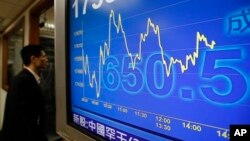Many people are concerned about signs of weakness in the Chinese economy. They want to know how these changes will affect economic activity in the rest of the world.
The Group of 20 major economies are holding talks in Turkey at the end of this week. American and Japanese officials want financial leaders and central bankers to make China’s economy a central issue at the G20 meetings.
On Tuesday, Japan’s Finance Minister called for a “frank debate at the G20 about what is happening in the Chinese economy.” And a U.S. official speaking before the meeting called on China’s government to “carefully communicate its policy intentions and actions to financial markets.”
Falling stock prices have shown that investors are very concerned. Many believe that a weak Chinese economy will affect other markets. On Tuesday, China’s official manufacturing index fell to its lowest level in three years. Leading measures of stock values dropped in East Asia, Europe and the United States.
The world’s financial leaders are watching. International Monetary Fund chief Christine Lagarde spoke during a visit to Indonesia. She said rapid changes in stock market prices show concerns that economic uncertainty could spread.
"What has been demonstrated in the last few weeks,” she said, “is how much Asia is at the core of the global economy, and how much disruptions occurring in one market in Asia can actually spill over to the rest of the world.”
Asia is not the only area that could be affected. Experts note that China’s problems could hurt manufacturing in Germany, Europe’s largest economy. Experts note that Chinese reform efforts have been uneven and present different problems for China’s trading partners.
Scott Kennedy is with the Centers for Strategic and International Studies in Washington. He says China’s economy is changing.
“The Chinese economy is gradually shifting from one that is primarily based on industry and fixed asset investment to one where services and individual consumption are much more important."
But he adds that issues like reducing debt and reforming state-owned businesses may hold back the economy.
“And if China’s industrial economy doesn’t find a way to absorb the debt that it’s built up — deleverage reform state owned enterprises that’s going to keep the Chinese economy from growing rapidly.”
Mr. Kennedy says the economic slowdown in China is affecting two groups of countries. The first group provides raw, unprocessed materials to China. The other group includes Southeast Asia and countries that are trade competitors of China. They are affected by the devaluation of China’s currency. It makes Chinese exports less costly and reduces the value of the country’s money.
I’m Mario Ritter.
Material from Bill Ide, Joyce Huang and William Gallo was used in this report. Mario Ritter wrote it for VOA Learning English. George Grow was the editor.
_____________________________________________________________
Words in This Story
intentions – n. the thing that you plan to do or achieve; an aim or purpose
core – adj. the most important or basic part of something
disruptions – n. to interrupt the expected progress or activities








